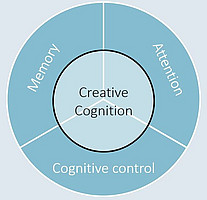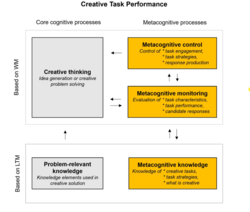The role of memory, attention and cognitive control
Creative thinking arises from the interplay of memory processes, attention processes and control processes. Specifically, we investigate the role of semantic and episodic memory content, spontaneous vs. controlled thought processes, and internally vs. externally directed attention.
Further reading:
- Benedek, M., & Fink, A. (2019). Toward a neurocognitive framework of creative cognition: The role of memory, attention, and cognitive control. Current Opinion in Behavioral Sciences, 27, 116-122. https://doi.org/10.1016/j.cobeha.2018.11.002
- Benedek, M., Beaty, R. E., Schacter, D. L., & Kenett, Y. N. (2023). The role of memory in creative ideation. Nature Reviews Psychology, 2(4), 246-257. https://doi.org/10.1038/s44159-023-00158-z
- Benedek, M. & Jauk, E. (2019). Creativity and cognitive control. In J. Kaufman & R. Sternberg (Eds.), Cambridge handbook of creativity (pp. 200-223). Cambridge: Cambridge University Press. https://doi.org/10.1017/9781316979839.012
-
Benedek, M. (2018). Internally directed attention in creative cognition. In R. E. Jung & O. Vartanian (Eds.), The Cambridge handbook of the neuroscience of creativity (pp. 180–194). Cambridge University Press. https://doi.org/10.1017/9781316556238.011


Metacognition in creative thinking
How do we go about creative thinking? Creative problems typically cannot be solved in established ways. This is why we often question our own approach. Reflecting on your own creative thinking is called metacognition. We have proposed a systematic framework for creative metacognition in which a distinction is made between core and metacognitive processes. The metacognitive processes include regulation and evaluation processes (control and monitoring) as well as the retrieval of metacognitive knowledge at different levels.
Further reading:
- Lebuda, I., & Benedek, M. (2023). A systematic framework of creative metacognition. Physics of Life Reviews, 46, 161-181. https://doi.org/10.1016/j.plrev.2023.07.002